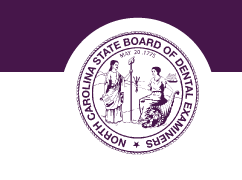|
|||||||||||||||||
|
Interpretive Statements
INTERPRETIVE STATEMENT REGARDING THE REQUIREMENT TO PROVIDE EMERGENCY CARE TO A PATIENT DISMISSED FROM A DENTAL PRACTICE The Board clarifies that the obligation to provide emergency care upon dismissing a patient from the dental practice is subject to reasonable exceptions. The Board’s position is that a dentist is not required to provide 30 days of emergency care to a patient if the dentist reasonably believes it is unsafe to do so because the patient was dismissed for engaging in behavior involving violence, threats, intimidation, or harassment toward the dentist or the dental practice’s employees or staff. The dentist must document in the record the patient’s menacing behavior and that the patient was advised that emergency care would not be provided. To read the Board’s guidance regarding such circumstances, click here. INTERPRETIVE STATEMENT REGARDING THE APPLICATION OF CURODONT AS A DUTY THAT MAY BE DELEGATED TO A DENTAL HYGIENIST The Board provides interpretation and guidance regarding the application of Curodont Repair Fluoride Plus (“Curodont”) as a duty that may be delegated by a dentist to a dental hygienist, consistent with the Dental Hygiene Act and the Board’s rules. To read the Board’s discussion of the applicable requirements set out in the Dental Hygiene Act and the Board’s rules, and the application of Curodont as a duty that may be delegated to a dental hygienist provided the delegation is done in compliance with those requirements, click here. INTERPRETIVE STATEMENT REGARDING TELEDENTISTRY STATUTE AND SUPERVISION OF DENTAL HYGIENISTS The Board clarifies that the teledentistry statute did not alter the supervision requirements for dental hygienists and explains the limited circumstances in which teledentistry services may be provided. To read the statement regarding teledentistry services and the supervision of dental hygienists, click here. INTERPRETIVE STATEMENT REGARDING MONITORING PATIENTS DURING SEDATION PROCEDURES The Board provides interpretation and guidance regarding acceptable standards of care, consistent with the Board’s rules, for monitoring patients throughout a sedation procedure involving administration of general anesthesia, moderate conscious sedation, or pediatric moderate conscious sedation, including the acceptable roles of the dentist administering the anesthesia or moderate sedation as it relates to monitoring the patient. To read the statement regarding monitoring patients during sedation procedures, click here. INTERPRETIVE STATEMENT ON ELECTIVE COSMETIC PROCEDURES The Board has revised an earlier statement on elective cosmetic procedures and the use of certain medications primarily used for cosmetic enhancement. The revision is based on peer-reviewed scientific studies demonstrating the efficacy of certain of these drugs in treating dental conditions. To read the interpretive statement, click here. INTERPRETIVE STATEMENT REGARDING INFORMED CONSENT To protect the public interest, the North Carolina Board of Dental Examiners (Board) provides interpretation and guidance regarding acceptable standards of care on the issue of patients’ informed consent. To read the Board's Interpretive Statement, click here. INTERPRETIVE STATEMENT REGARDING AUXILIARIES PROVIDING ASSISTANCE IN ADMINISTERING SEDATION OR ANESTHESIA
Click here to see the text of the Board's Interpretive Statement to accompany their Rules on administering Sedation and Anesthesia INTERPRETIVE STATEMENTS REGARDING ANXIOLYSIS To protect the public interest, the Board issued two interpretive statements regarding the administration of anxiolytics. To read the statement regarding the administration of anxiolysis to adult and geriatric patients, click here. To read the statement regarding the administration of anxiolysis to pediatric patients, click here. The Board’s statements provide interpretation and guidance regarding acceptable standards of care, consistent with the Board’s rules, to administer anxiolytics, including acceptable anxiolytic drugs, permissible dose amounts, and the appropriate timing of a single dose that constitutes anxiolysis and, therefore, does not require the dentist to hold a current, unrestricted sedation permit. DENTAL BOARD - OEMS JOINT POSITION STATEMENT REGARDING EMS PERSONNEL FUNCTIONING IN DENTAL OFFICE SETTINGS The Board and the North Carolina Office of Emergency Medical Services issued a joint position statement for the purpose of providing guidance to North Carolina dentists and EMS personnel regarding the current regulatory framework governing permissible practice settings for EMS personnel in this State. Under the current regulatory framework, paramedics and other EMS personnel working in a dental office under the supervision of a dentist who is licensed by the Dental Board but is not licensed by the NC Medical Board may not perform any functions beyond those performed by other dental assistants utilizing skills from BLS certification. To read the joint position statement with a detailed discussion and examples, click here. |
|
||||||||||||||||




